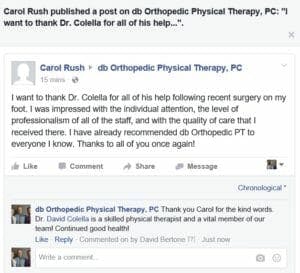Published in the News Transcript and Independent Newspapers:
Hip pain – dry needling vs. cortisone injection
A recent study in the Journal of Orthopedic and Sports Physical Therapy found that cortisone injections to the lateral hip in the trochanteric bursa did not provide greater pain relief or reduction in functional limitations compared to dry needling performed by a physical therapist. They concluded that the bursa may not be the source of the lateral hip pain and that it is injury to the muscles and tendons in the area that responded better to the dry needling technique. Click below to read the JOSPT Perspectives for Patients.
Another positive review about the care we provide at dbOrtho PT! Kudos to Dr. Colella!
Dr. Bertone to be a featured speaker at the Private Practice Section of the APTA in Nov 2017
Dr. Bertone will be presenting a lecture to a national audience at the PPS of the American Physical Therapy Association in Chicago, IL in Nov 2017 on Concussion management. He will be teaching other private practice members on how to successfully design a concussion management program for their practices.
Vote db Ortho PT Best of Monmouth!
6 weeks left to vote for us as the Best Physical Therapy practice in Monmouth County!
- Select Beauty and Wellness Category
- Select physical therapist in drop down menu
- Write in db Orthopedic Physical Therapy
https://healthandlifemags.com/monmouth/December-2016/Vote-for-the-Best-of-Monmouth/
Our offices will be closed all day on Tuesday, March 14, 2017 in anticipation of snow storm!
We will reopen for normal business hours on Wed, March 15th at 8:00am. If you have any questions, please call the office and leave a message. Someone will get back to you as soon as possible. Be safe!
Physical Therapy for acute and chronic LBP by Dr. Jerry Moczerniuk, PT, DPT
Learn how physical therapy can help for your acute or chronic LBP.
Dry Needling update – NJ BPTE ruled today to allow a grace period before PT’s are required to stop performing dry needling.
In order to ensure continuity of care for the patients we treat, the NJ Board of Physical Therapy Examiners ruled today to allow a grace period tentatively set until Jan 31, 2018 before PT’s must stop performing dry needling in NJ in accordance of the NJ Attorney General opinion recently released. After numerous patients testified, it became apparent to the BPTE members that an undo hardship is being passed upon the consumers of NJ currently benefiting from dry needling performed by their physical therapist. The hardship would require these patients to travel long distances to Delaware or Connecticut where physical therapists are allowed to perform this procedure.
This grace period will allow the American Physical Therapy Association of NJ to push for permanent legislative relief and place the procedure of dry needling within the statutes of the Physical Therapy Practice Act. Stay tuned for more information as it develops.
All 3 Physical Therapists at db Ortho PT are trained in this skilled technique that has help hundreds of patients improve their functional levels.
What is your Pain Profile?
Fill out this form to see how you score with managing pain. Then consider Physical Therapy before you choose addicting Opioids or other medications.
Take a Fit Factor Survey and learn prevention strategies!
https://fitfactorsurvey.org/fit-factor/survey/a/qa0/qa.cfm
Take the Fit Factor survey created by the Private Practice section of the American Physical Therapy Association. This online survey will provide users with personalized feedback and interactive tools for improving your physical health.
Effective – 2/9/17 – Dry needling by a Physical Therapist in NJ is no longer allowed.
The Attorney General of New Jersey has written an opinion that dry needling is NOT within the scope of practice for the physical therapist in NJ even though the NJ Board of Physical Therapy Examiners has ruled it to be a skill included in manual therapy. Effective immediately, the physical therapists trained in the skill at db Orthopedic Physical Therapy will stop performing this technique until the ruling is argued or legislative relief occurs. Thousands of patients across NJ have been benefiting from this therapy tool for several years without one reported incident of injury or adverse affect report to the NJBPTE. Patients are encouraged to contact their legislator to voice an objection to a non-drug source of pain control performed by many other physical therapists legally in several states. This is clearly a case of a turf battle with other practitioners trying to limit availability for patients. More to come
Weather alert – Both our offices will be closed on 2/9/17 due to the inclement weather. We will reopen Fri, 2/10 for normal business hours.
Coming Soon…

